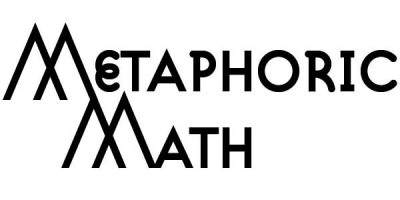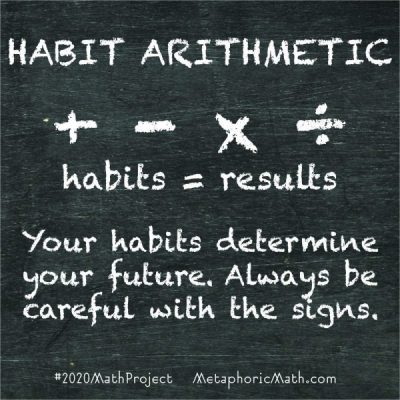The #2020MathProject is centered around gaining clarity of the values of habits in relation to goals.
In order to more accurately assess the value of your habits, you have to spend some time getting clear on your values and goals. What is the underlying why that motivates you to take action?
I just finished rereading Stephen Covey’s perennial bestseller The 7 Habits of Highly Effective People, (which lays an essential foundation for a principle-centered approach to problem solving), and was struck by his first answer in the 2004 Afterword regarding his key learnings about the 7 Habits since the book’s release in 1989:
“The importance of understanding the difference between principles and values. Principles are natural laws that are external to us and that ultimately control the consequences of our actions. Values are internal and subjective and that which we feel strongest about in guiding our behavior.”
– Stephen Covey
Once you’ve identified some guiding values for your life, it becomes much easier to evaluate the importance of specific habits and attach motivation to your actions. This is what gives resolutions sticking power.
Before I go further and since only 3 days remain before we kick off 2020, here’s a recap of some of my thoughts thus far on approaching goals and resolutions in the new year:
- 3. Goals + Action = Success – Statistics on New Year’s Resolutions and the case for SMART goals.
- 2. Calculate the Year in Review – Conduct an evaluation of the past year instead of focusing on resolutions.
- 1. Numero Uno – What is the one word or thing that guides your actions?
The next logical step is to focus on habits. The logic and emotion of habit making and breaking fascinates me, and I’ll be studying a variety of opinions and scientific approaches to habits over the course of 2020.
Habit arithmetic takes it back to the basics. Here’s how you can reframe the way you look at habits: boil it down to things you can add or subtract from your routines. Think of small changes that will make it easier to achieve a multiplication effect once positive habits are established. Divide your life into categories (Personal, Business, Relationships, Fitness, Education, etc.) and segments (Days, Weeks, Months, 1 Year, 3 Years, 5 Years, Decades).
This is the foundation of the Subtraction Multiplies Abundance formula.
Strive to reach a balanced equation in terms of adding and subtracting habits. The hours in each day are finite but many habits are difficult to quantify, so you have to be intentional how you add and subtract from your routine. Most people try to juggle too many things at once. Step back and evaluate what you can subtract first, as you have to clear space in your routines in order to find time and energy to add new habits. There are many habits with positive benefits to choose from, but you don’t have capacity for them all. Decide which habits have the most potential to align with your values and goals, and focus on a first things first approach. Eventually, the positive shifts you make will have a multiplication effect on your efforts, which in turn will give you increased capacity and momentum to create abundance in your life.
The value of Subtraction is the inspiration for the 2020 Math Project, and I am a proponent in the case for minimalism. However, I can also appreciate a tendency toward maximalism, particularly in an artistic sense. I’m most interested in exploring the Buddhist principle of “the middle way” as it pertains to habit arithmetic and how the whole can be greater than the sum of the parts.
Derek Sivers outlines subtraction succinctly on his blog. “It’s easy to think I need something else. It’s hard to look instead at what to remove.” Finding a balance with addition and subtraction requires conscious awareness and evaluation; while most people in modern society can benefit from increasing their focus on subtracting (oxymoron 101), keep in mind that our tendency toward filling the void with an alternative habit is strong, so be prepared with a positive substitute as you redirect focus away from negative habits.
Use the following lists as a starting point for creating your own habit equations; they are in no particular order. Everyone is different, so some habits could be a positive or a negative depending on how they impact your time and energy.
Subtraction
- Negative self talk
- Reduce clutter
- Reduce or eliminate specific foods & beverages
- Reduce or eliminate alcohol & other substances
- Quit smoking
- Don’t procrastinate
- Reduce stress
- Reduce TV watching
- Reduce screen time
- Set limits on social media
- Unfollow negativity
- Buy less
- Just say no
- Wait
- Lose weight
- Quit making excuse
- Refuse to gossip
- Don’t be tardy
- Stop venting and complaining.
- Forget the past
- Let it go
- Don’t take things personally
- Simplify
- Don’t overreact
- Don’t lose your temper
- Own less
- Avoid time wasters
- Be careful
- Don’t make assumptions
Addition
- Read more
- Journal regularly
- Exercise
- Tidy up
- Splurge
- Invest
- Learn a new skill
- Pursue a hobby
- Be more social
- Just say yes
- Do it now
- Travel
- Increase earnings
- Meditate
- Express gratitude
- Get more sleep
- Take action
- Relax
- Schedule fun time
- Practice mindfulness
- Positive self talk
- Stay in touch with friends
- Talk to strangers
- Make mistakes
- Spread joy
- Go outside
- Be silly
- Be loving
- Ask for help
- Take risks
- Problem solve
Any other habits you want to add or subtract? Feel free to add your own suggestions in the comments. Starting in January, I will explore ways to make and break habits that stick alongside strategies to maximize a return on investment from your positive habits.
Additional References and Resources:
“50 New Year’s Resolution Ideas And How To Achieve Each Of Them”
“25 Habits of Successful and Extremely Happy People”
“Why Most New Year’s Resolutions Fail and What You Should Do Instead”
Resource Guides by Gretchen Rubin

